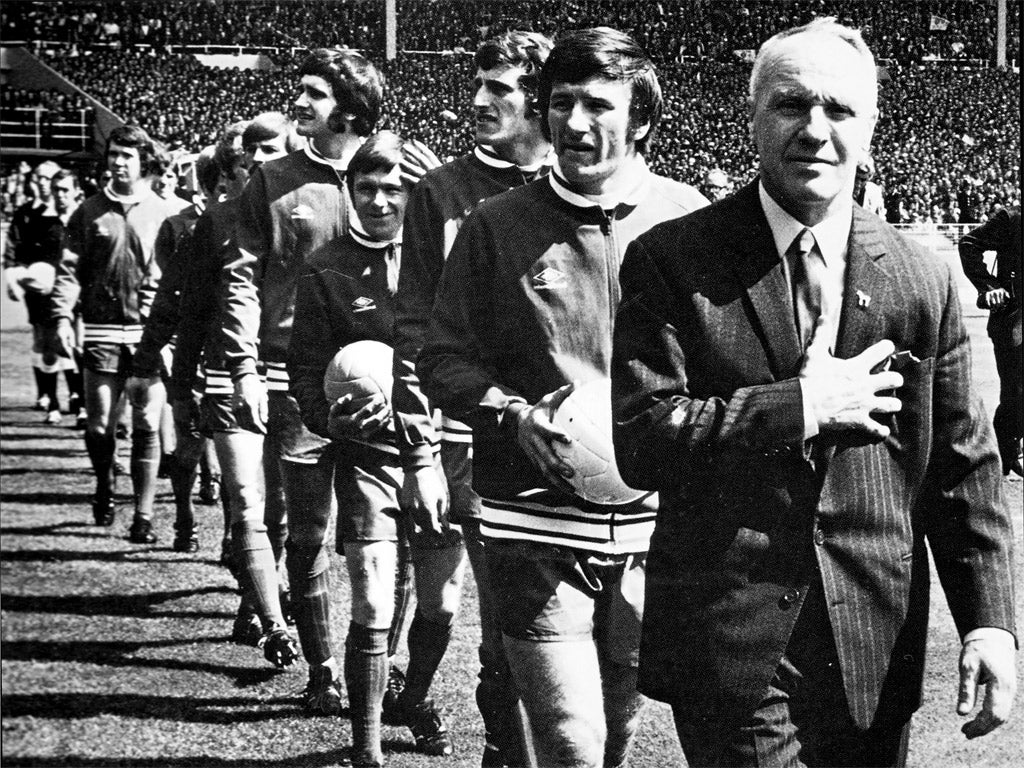James Lawton: Bill Shankly's story was filled with heroes and monsters, stranger than any fiction
David Peace's latest football confection doesn't tell us anything that we don't already know

Already the rave reviews are tumbling in for David Peace's latest football confection, Red or Dead, a version of Bill Shankly's life, and one of the most fulsome of them concludes: "This isn't a book about the way things were or the way things are. This is about the way things should be."
Herein, of course, lies the problem and it is a huge one. Peace and his publishers were successfully sued by Johnny Giles, a leading victim in the travesty of reality which the author worked in his hugely acclaimed treatment of Brian Clough's brief, ill-starred reign at Leeds United, and some said the Irishman was wrong to halt the production of a most entertaining and skilled piece of "faction" and cause the junking of many copies.
This view depended on whether (a) you knew the first thing about events at Elland Road in those tumultuous days and (b) you accepted that the real lives of real people were legitimate fodder for someone who, while clearly a gifted writer of fiction, was in search of a ready-made plot of extremely doubtful provenance. Giles rejected the second proposition with some vigour and he was right to do so.
Judging by extracts from the new work Peace appears to be in less danger of indignant courtroom action.
There are extremely long, impressionistic passages about some of the better known aspects of an extraordinary life, specifically Shankly's reverence for the memory of fighters like Jack Dempsey and Gene Tunney, his awkward parting with one of the greatest of his signings, Ian St John, and the anguish that came with his sense, rightly or wrongly, that all his achievements at Anfield had been quickly forgotten by the Liverpool board. They do not tell us anything, emotionally or factually, that we don't already know.
But then so far, so good – the fictional liberties do not appear to have ridden roughshod over the nuances of a great if extremely eccentric man's life.
Heaven knows, they were not exactly the best-kept secrets, as one discovered many years ago in his little office beneath the main stand at Anfield.
It was at that time when Shankly, having disposed of his first wave of key players, including the St John in whom he saw in their warmest days the qualities of a potentially fine middleweight, was building a new Liverpool.
It would, he said, be as dynamic as the one he had first fashioned when he brought St John and Ronnie Yeats down from Scotland, and in his enthusiasm for the project he got up from his seat and stood on the desk he had been pounding for some time. He stretched himself, his arms reached almost to the ceiling and he declared: "This team is going to go off like a great bloody bomb in the sky."
This, bizarrely enough, was the moment when one of his emerging young stars knocked on the door. Shankly half opened it and said, "Aye, laddie, what do you want? I'm busy now."
The young man's business was urgent enough. He would not be able to play in the coming game with Everton. His girlfriend was pregnant and his mother had arranged the wedding for the weekend. Shankly was aghast. "How can you come to me with this," he said, "don't you know we are fighting for our lives?"
It happened that Shankly had ordered his assistant Bob Paisley to arrange for a steady supply of steak to be taken to the boy's home. He was a gifted kid, but he needed building up. Later, Shankly saw Paisley in the corridor and he said to him, "Jesus Christ, Bob, we've bred a monster."
Shankly's life was filled with heroes and monsters, saints and villains, and in football it is hard to imagine one in less need of fictional adornment.
St John touched on this in the prologue of his autobiography, a work of scrupulous fact, when he wrote: "I found myself standing alone behind the Kop, gazing intently at the bronze image of Shankly, the legendary figure who for me will always be flesh and blood, almost human to a fault.
"Conflicting emotions rise to the surface when I think of him. I'm torn between love and hate, admiration and sometimes at least a little anger and disillusionment. On that day at Anfield, though, I wasn't looking at my Shankly, my patron, the arbiter of all my hopes for ten years of the prime of my life but the one who was imprinted so deeply on the wider consciousness of football and who was adored by the people of Liverpool. I focussed on the inscription, 'He made the people happy' and I thought, 'Aye, he did that'."
It is why the latest staging of The Bill Shankly Story at the Gladstone Theatre, Port Sunlight, on 18 October, to commemorate the 100th birthday of his birth, is certain to be another sell-out. Included in the witnesses will be St John, Ian Callaghan, Chris Lawler, Yeats and the fine chronicler of Merseyside football lore, John Keith.
One highlight will be Lawler's now hilarious account of the ferocious reaction to his decision to rule out a five-a-side goal scored by the manager at the end of training. "You haven't spoken for a year and the first thing you come out with is a lie." One thing is certain. If Shankly had been alive to read Red or Dead there would have been no keener observer of that line between truth and fiction.
Join our commenting forum
Join thought-provoking conversations, follow other Independent readers and see their replies
Comments